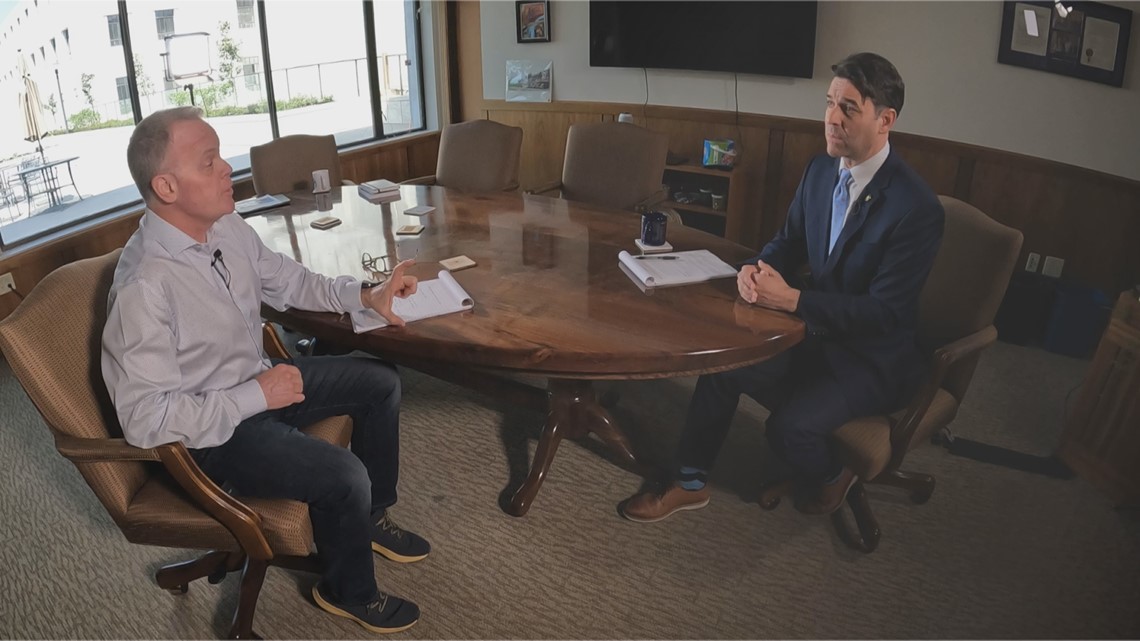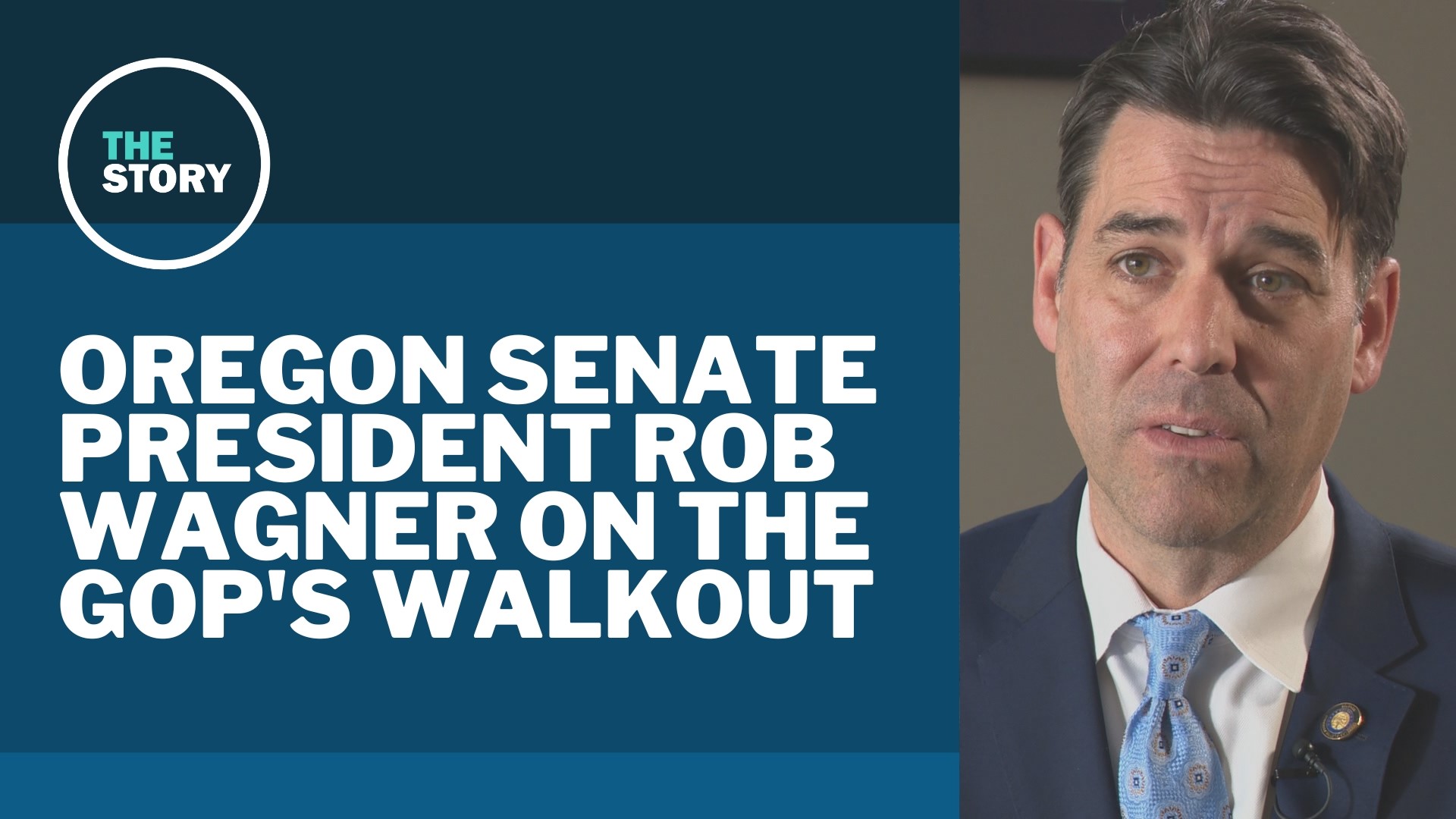SALEM, Ore. — The Republican legislative walkout in the Oregon Senate is about to enter its fifth week, and all signs currently point to the standoff continuing right up to June 25, the constitutionally mandated last day of the session.
KGW's Pat Dooris recently sat down with Senate President Rob Wagner to get his take on what's been happening (or not happening) in Salem and how he sees this all ending.
Senate rules require at least two thirds of the chamber's 30 members to be present in order to conduct business, and Democrats only control 17 seats, so Republicans have been able to bring proceedings to a halt by fleeing the capitol. It's the same tactic they've deployed every year since 2019.
This year's Republican walkout is aiming to run out the clock on two particular bills: House Bill 2002, which expands protections for abortion and gender-affirming care, and House Bill 2005, which imposes new gun control regulations. But the standoff also threatens to scuttle all other remaining legislation, including some big bipartisan priorities.
Republicans have offered to return on the final day, but only to vote on certain bills, presumably excluding HB 2002 and HB 2005. Wagner has already declared that idea a non-starter, saying that Republicans shouldn't get to pick and choose what legislation comes up for votes.
This is Wagner's first year as Senate President, but his legislative roots run deep. He worked as an aide in the Oregon House in the late 1990s, then spent a decade working for a teachers union, then served as vice president at the college of advancement at Portland Community College.
His first elected office was a Lake Oswego School Board seat in 2017, and then was appointed to fill a vacant Oregon Senate seat in 2018, winning a new term in the election later that year.
The first half of the interview with Wagner airs Monday on The Story, and a transcript is available below, lightly edited for clarity. The second half will air Tuesday on The Story.


How does it end?
Pat Dooris: So, we're well into the walkout now. How does this thing end, do you think?
Rob Wagner: Well, honestly, Pat, I'm hoping that it ends with people coming back into this building, and we go onto the floor and we do what the voters have sent us here to do. And that is consider bills and vote them on the floor.
Dooris: So what's it take to get people to come back?
Wagner: I think we're still in conversation with a lot of people. Ultimately though it's going to be people in communities and having conversations about why it's important. Why do they trust their democracy? What do we do here, and how they (Republicans) need to just come back and be able to participate. That's what the constitution requires people to do.
Dooris: So you're saying voters in the areas where the Republicans are need to start pressuring them to come back?
Wagner: I wouldn't say the word pressure. I think it's just really important that people understand what we do in this building that impacts their lives. Right now, we have committees that are passing budgets for education and senior services and infrastructure. We have bipartisan bills that are just stacked up and waiting for people to vote on. I think when we get the message out about what actually happens here, that people are going to want to come back and do their constitutional duty and vote on bills.
House Bill 2002
Dooris: Well, we'll see. But (Republicans) have said 'we will come back and vote on those bipartisan bills.' But you won't touch (House Bill) 2002, right?
Wagner: No, we've been pretty clear about that, actually, since the beginning of session. And really, when you look at voters and what they're asking us to do, ever since the decision that overturned Roe v. Wade, Oregon voters have said we need to protect access to reproductive health for women in this state.
Dooris: But are they saying that that people 15 and younger need to be able to get an abortion without their parental consent?
Wagner: So I think it's important when you look at (HB) 2002, what that bill actually does is clarify and codify 50 years of Oregon law that has been there since Roe v. Wade passed.
Dooris: And I understand that has been the practices in some areas, but in other areas not so much. OHSU has it on their website that (if you're) younger than 15, you need parental permission.
Wagner: Yeah, I'm not a technical expert on this. I certainly can put you in touch with Sen. Steiner or Sen. Lieber or others who have practiced in this space. I do know that my understanding of that legislation is that we need to make sure that women have access to reproductive healthcare. That's what this bill does. It's not expanding any rights. It's clarifying the fact that Oregon is a pro-choice state and that we're making sure that women are protected.
Dooris: Is there any scenario in there that you see a compromise within that bill?
Wagner: No, the bill is set to go. So right now we have a very robust committee system in the state of Oregon, probably more robust than any other state in the entire country. That bill had months of work leading up to the legislative session. It received a hearing in the House. It received a bipartisan hearing through the ways and means process. It has received a floor vote in the House where the Republicans, I do want to note, stayed. And they had diligent debate and raised a lot of questions, and then they voted on it. And that's what people are asking the Republicans in the Senate to do, is to come back and vote on that bill.
Dooris: But are you willing to drive the session off a cliff for that bill?
Wagner: Well, I'm not driving anywhere off a cliff. I can tell you this, that Oregon voters are expecting us to be here session after session, voting on legislation. And that's what we're committed to do.
Oregon's frequent walkouts
Dooris: You've been in this legislature during other walkouts in the past. Does that color sort of the way things are going now?
Wagner: Well, I think it's — you've seen a pattern that we've seen, the minority sort of weaponizing the quorum right now-
Dooris: In one of the few states in the country where they can do that.
Wagner: Absolutely. And so it's disappointing, as someone who's been around the process as long as I have and just loves our constitutional democracy. At the same time — I guess the question was 'does it sort of color my experience'?
Dooris: And does it give you any insights into how you can navigate through this?
Wagner: I think what's really important is that we've established a very clear tone and the voters are fed up with it. When Measure 113 passed this last fall, it passed with over 68% of the vote, and it passed in every single state senate district. And so what I think the voters were clear at saying is, people need to not get paid if they don't show up to work, and they need to be here and voting on legislation that mattered their lives.
Dooris: So that did pass, but it's not having an impact on this session and it's not going to get you out of this jam.
Wagner: Yeah, I mean, we'll have to see, I think there's still 30 days left in the legislative session, which for us is a really long time. And so we're just going have to see how that plays out.
Dooris: Alright, but just to be clear: No way, no how — you're (not) moving at all on (HB) 2002?
Wagner: No, that bill is definitely set. That is definitely for our members. It's a bright line. Women need reproductive health services in Oregon. We are not going back on our commitment to codifying Roe.
Dooris: Although just one last argument along those lines. Just intellectually, women are able to get abortion services in Oregon right now. Even without that bill.
Wagner: Yeah. Again, I'm not the most technical expert on it. I would definitely have you talk to Sen. Steiner or (rather) Dr. Steiner or somebody like that. But my understanding of the legislation is that what this does is it makes sure that there's insurance protection, that we're making sure doctors are actually covered for the services that they're providing. And there's another element of this bill, which I think kind of sometimes gets ignored, and that is having access to gender affirming care. And so I don't want to ignore that. I think it's really important. We've heard it confirmed by constituents how important that is as well.
Pressure for a resolution
Dooris: Alright. What about the other bills that seem to be on that (Republican) kill list, as I understand it? That'd be the gun bill and... I'm spacing on what the third one is.
Wagner: I don't know if you've seen a list, we haven't seen a list. But even with that, I think people are done with sort of backroom deals where people are putting together kill lists on legislation. We're asking people to be really transparent if they have objections to particular legislation — then make your argument, make it in committee, make it during an election cycle, make it here and make it on the Senate floor. So in terms of these kind of backroom deals around kill lists, I think people are done with that. We want legislators from all over the state to come with wish lists. We want them to show up with things that they want to work on together.
Dooris: Well, the Republicans would wish that you'd move (HB) 2002 out-
Wagner: Well like I said, I don't think that's where the majority of voters are, and that's not what they sent us here to do.
Dooris: As time goes by, I wonder if the pressure increases on you from your constituents, saying 'fix this, figure this out.' What's that like?
Wagner: I will say, my constituents have been very clear that Oregon is a pro-choice state and they support that legislation and they support the position that we're making right now.
Dooris: But is there a growing pressure on you to try and figure out a solution before the session's done?
Wagner: Not that I felt.
Dooris: And do you worry that, as time goes by, that your own members might have second thoughts? We've seen that happen in past sessions.
Wagner: I'm not (worried). You can talk to members individually, and what's nice about the Oregon State legislative process is that I'm here as the Senate President, I have a job in helping the Senate function. But every individual senator has the opportunity to bring the values from their constituents forward and have that robust debate. That's why we have a democracy.
Dooris: Well, you have a team, but you're the coach, right?
Wagner: I don't know. I don't necessarily think that's an apt characterization. I think it's more just, maybe if you want to say a facilitator, that's fine. But I'm not putting individual people in and out of the game. Everybody's in the game. Everybody's here to play because their voters sent them here.

